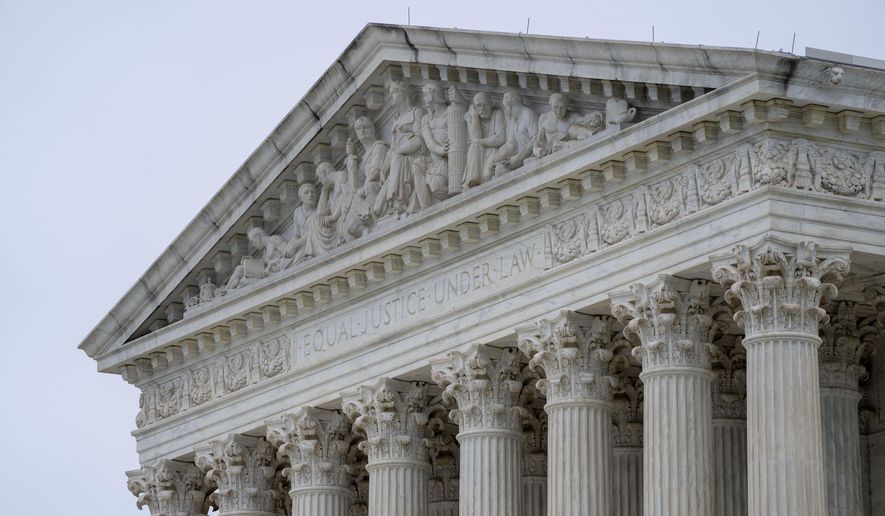The Supreme Court rolled back the Environmental Protection Agency’s reach over U.S. waterways, dousing the Biden administration’s regulatory push and handing a victory to an Idaho couple blocked from building a house because the agency deemed their property a wetland.
The high court on Thursday said the federal government may regulate wetlands only that have a “continuous surface connection” to a body of water covered by the Clean Water Act, which protects “streams, oceans, rivers and lakes” and other “navigable waters.”
The court rejected former Justice Anthony Kennedy’s “significant nexus” test, a 17-year-old standard that let the EPA exert regulatory authority over potentially hundreds of millions of acres of land located in the vicinity of bodies of water.
“By the EPA’s own admission, nearly all waters and wetlands are potentially susceptible to regulation under this test, putting a staggering array of landowners at risk of criminal prosecution for such mundane activities as moving dirt,” said Justice Samuel A. Alito Jr. in the 82-page opinion for the majority.
Justice Alito wrote the opinion on behalf of the five-justice majority. The other four justices concurred in separate opinions using different reasoning. There was no dissenting opinion.
He found that the EPA’s argument that “water” automatically encompasses “wetlands” because water is a basic feature of wetlands “proves too much.”
President Biden slammed the court’s “disappointing decision,” contending it will “take our country backwards.”
“It puts our nation’s wetlands – and the rivers, streams, lakes, and ponds connected to them – at risk of pollution and destruction, jeopardizing the sources of clean water that millions of American families, farmers, and businesses rely on,” said Mr. Biden in a statement.
EPA Administrator Michael Regan said he was “disappointed” by the ruling, saying it “erodes longstanding clean water protections.”
“The Biden-Harris administration has worked to establish a durable definition of ‘waters of the United States’ that safeguards our nation’s waters, strengthens economic opportunity, and protects people’s health while providing the clarity and certainty that farmers, ranchers and landowners deserve,” he said. “These goals will continue to guide the agency forward as we carefully review the Supreme Court decision and consider next steps.”
The court’s decision flies in the face of the Biden administration’s expanded Waters of the United States rule, which repealed a Trump-era rule that had reined in the EPA’s authority over concerns about stifling farming and development located near creeks, ponds, bogs and even irrigation ditches.
The Biden rule was temporarily blocked by a federal court shortly after taking effect in March. The Republican-led House failed last week to override President Biden’s veto of a resolution to undo the rule making.
Big win today at the US Supreme Court. My office led a 26 state amicus effort in support of a more accurate definition of the “waters of the United States.” Earlier this year, in a separate case, we obtained a preliminary injunction of the new Biden Administration WOTUS policy.…
— Patrick Morrisey (@MorriseyWV) May 25, 2023
West Virginia Attorney General Patrick Morrisey called it a “big day for farmers, homebuilders, contractors, property owners and those who care about economic activity not being subject to overreach by the federal government.”
“We now have a clearer definition for Waters of the United States, and we’re pleased the Supreme Court ruled in a way that state lands and waters are less subject to the whims of unelected bureaucrats,” said Mr. Morrisey, part of a 26-state coalition of attorneys general that sided with the Sacketts.
Michael and Chantell Sackett were stopped from backfilling their newly bought property in a residential neighborhood near Priest Lake, Idaho, after the EPA determined in 2007 that the parcel was a wetland, ordering the couple to restore the site and threatening them with fines of up to $40,000 a day.
“The EPA’s confused, convoluted and overbroad understanding of wetlands subject to its regulation would have been costly to property owners who would have spent years and tens or even hundreds of thousands of dollars just getting permission from the federal regulators to build on their own property,” said Mr. Morrisey.
Joining Justice Alito in the majority were Chief Justice John G. Roberts Jr. and Justices Clarence Thomas, Neil M. Gorsuch and Amy Coney Barrett.
• Valerie Richardson can be reached at vrichardson@washingtontimes.com.




Please read our comment policy before commenting.